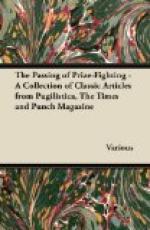“No, no, doctor; let the poor man rest quietly, and here is a trifle for your trouble.” So saying, she slipped a weighty purse into my hand.
“This alters the case,” said I, “materially—your late husband shall never be disturbed by me.”
The widow withdrew with a profusion of acknowledgments; and scarcely had she gone, when a young fellow, who I learned had lately come into possession of a handsome property by the death of an uncle, came to request me not to meddle with the deceased, who he assured me was a shocking old curmudgeon, who never spent his money like a gentleman. A douceur from the young chap secured the repose of his uncle.
My next visitor was a weazel-faced man, who had been plagued for twenty years by a shrew of a wife, who popped off one day from an overdose of whiskey. He came to beseech me not to bring back his plague to the world; and, pitying the poor man’s case, I gave him my promise readily, without accepting a fee.
By this time daylight had begun to appear, and creeping quietly out of the churchyard, I returned to my lodgings. Ned was waiting up for my return.
“What luck?” said he, as I entered the room.
I showed him the fees I had received during the night.
“I told you,” said he, “that we should have plenty of rhino to-day. Never despair, man, there are more ways out of the wood than one: and recollect, that ready wit is as good as ready money.”
* * * * *
THE PHYSIOLOGY OF THE LONDON MEDICAL STUDENT.
II.—THE NEW MAN.
Embryology precedes the treatise on the perfect animal; it is but right, therefore, that the new man should have our attention before the mature student.
No sooner do the geese become asphyxiated by torsion of their cervical vertebrae, in anticipation of Michaelmas-day; no sooner do the pheasants feel premonitory warnings, that some chemical combinations between charcoal, nitre, and sulphur, are about to take place, ending in a precipitation of lead; no sooner do the columns of the newspapers teem with advertisements of the ensuing courses at the various schools, each one cheaper, and offering more advantages than any of the others; the large hospitals vaunting their extended field of practice, and the small ones ensuring a more minute and careful investigation of disease, than the new man purchases a large trunk and a hat-box, buys a second-hand copy of Quain’s Anatomy, abjures the dispensing of his master’s surgery in the country, and placing himself in one of those rattling boxes denominated by courtesy second-class carriages, enters on the career of a hospital pupil in his first season.




